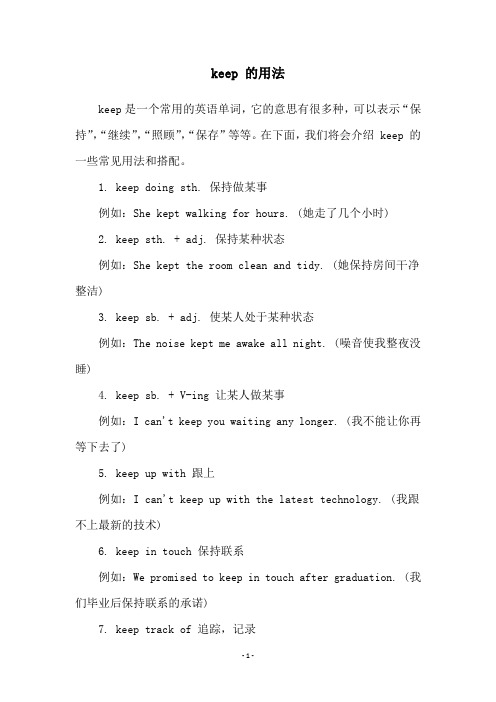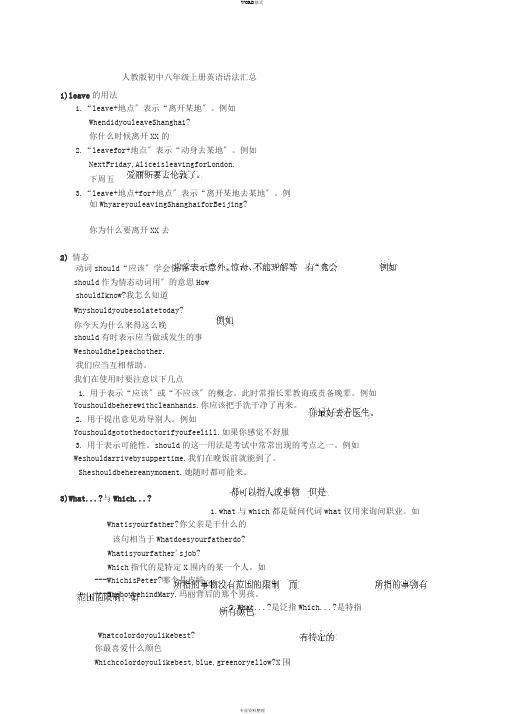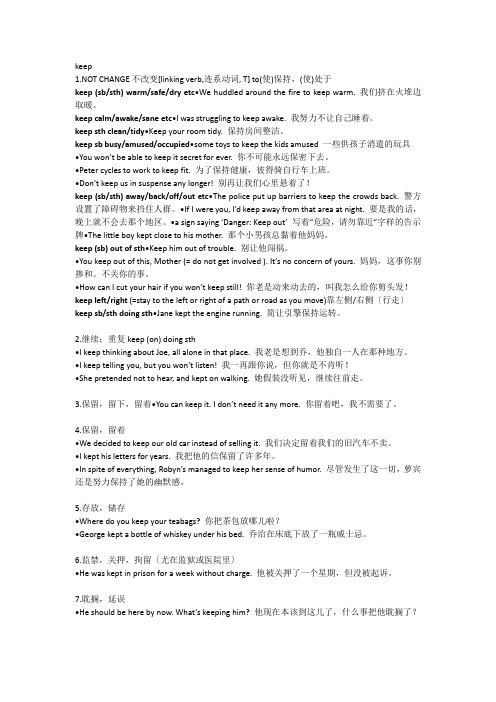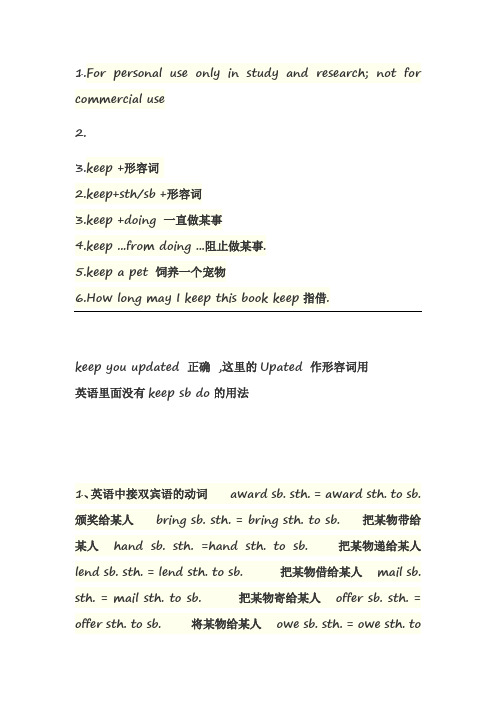keep的用法及of 、for sb.句型区别
keep 的用法

keep 的用法keep是一个常用的英语单词,它的意思有很多种,可以表示“保持”,“继续”,“照顾”,“保存”等等。
在下面,我们将会介绍 keep 的一些常见用法和搭配。
1. keep doing sth. 保持做某事例如:She kept walking for hours. (她走了几个小时)2. keep sth. + adj. 保持某种状态例如:She kept the room clean and tidy. (她保持房间干净整洁)3. keep sb. + adj. 使某人处于某种状态例如:The noise kept me awake all night. (噪音使我整夜没睡)4. keep sb. + V-ing 让某人做某事例如:I can't keep you waiting any longer. (我不能让你再等下去了)5. keep up with 跟上例如:I can't keep up with the latest technology. (我跟不上最新的技术)6. keep in touch 保持联系例如:We promised to keep in touch after graduation. (我们毕业后保持联系的承诺)7. keep track of 追踪,记录例如:She keeps track of all her expenses. (她记录了所有的开支)8. keep to 遵守,坚持例如:I always keep to my schedule. (我一直遵守我的计划) 9. keep away from 远离例如:You should keep away from drugs. (你应该远离毒品) 10. keep an eye on 留意,照看例如:Can you keep an eye on my luggage while I go to the restroom? (你能在我去洗手间的时候照看我的行李吗?) 以上就是 keep 的一些常用用法和搭配,希望对大家有所帮助。
重难点08 动词和动词短语-2023年中考英语【热点重点难点】专练(全国通用)(解析版)

专项一词汇重难点08动词和动词短语1.实义动词1.1.常考动词的用法辨析(1)look,see,watch,read的区别:(3)borrow,lend,keep的区别:1.2.及物动词和不及物动词(1)及物动词:可接单宾语、双宾语和复合宾语结构。
When someone gives me money, I feel they don't think at all.give后接双宾语(间接宾语+直接宾语)当有人给我钱时,我感觉他们根本就没有思考。
We elected him monitor of our class.elect后接复合宾语(宾语+宾补)我们选他当我们班的班长。
(2)不及物动词:不及物动词后面一般不可以直接接宾语,但有时不及物动词和介词或副词一起使用,构成动词短语,此时其后可以接宾语。
What will happen without electricity?没有电,会发生什么?I'm waiting for the bus.我正在等公交车。
1.3.延续性动词和非延续性动词(1)延续性动词表示一种可持续的行为过程或状态,可以和表示一段时间的状语连用。
而非延续性动词表示行为或过程在短暂瞬间内完成,不可以和表示一段时间的状语连用。
The film has been on for ten minutes.电影已经开始10分钟了。
The film began ten minutes ago.电影10分钟之前就开始了。
(2)延续性动词和非延续性动词的转换:连系动词指连接主语和表语的动词,主要用来说明主语的身份、性质、特征或状态。
连系动词只有主动形式。
2.助动词助动词本身没有词义或意义不完整,不能单独作谓语,只能和实义动词一起构成谓语,表示时态、语态、语气等,帮助构成否定、疑问、强调或省略等。
3.1.助动词be的用法be用作助动词和用作连系动词一样,有人称、数和时态的变化,主要用来构成进行时态和被动语态。
人教版初中八年级,上册英语语法汇总

人教版初中八年级上册英语语法汇总1)leave的用法1.“leave+地点〞表示“离开某地〞。
例如WhendidyouleaveShanghai?你什么时候离开XX的2.“leavefor+地点〞表示“动身去某地〞。
例如NextFriday,AliceisleavingforLondon.下周五3.“leave+地点+for+地点〞表示“离开某地去某地〞。
例如WhyareyouleavingShanghaiforBeijing?你为什么要离开XX去2)情态动词should“应该〞学会使用should作为情态动词用〞的意思HowshouldIknow?我怎么知道Whyshouldyoubesolatetoday?你今天为什么来得这么晚should有时表示应当做或发生的事Weshouldhelpeachother.我们应当互相帮助。
我们在使用时要注意以下几点1.用于表示“应该〞或“不应该〞的概念。
此时常指长辈教诲或责备晚辈。
例如Youshouldbeherewithcleanhands.你应该把手洗干净了再来。
2.用于提出意见劝导别人。
例如Youshouldgotothedoctorifyoufeelill.如果你感觉不舒服3.用于表示可能性。
should的这一用法是考试中常常出现的考点之一。
例如Weshouldarrivebysuppertime.我们在晚饭前就能到了。
Sheshouldbehereanymoment.她随时都可能来。
3)What...?与Which...?1.what与which都是疑问代词what仅用来询问职业。
如Whatisyourfather?你父亲是干什么的该句相当于Whatdoesyourfatherdo?Whatisyourfather'sjob?Which指代的是特定X围内的某一个人。
如---WhichisPeter?哪个是皮特---TheboybehindMary.玛丽背后的那个男孩。
keep的详细用法

keep1.NOT CHANGE 不改变[linking verb,连系动词, T] to(使)保持,(使)处于keep (sb/sth) warm/safe/dry etc•We huddled around the fire to keep warm. 我们挤在火堆边取暖。
keep calm/awake/sane etc•I was struggling to keep awake. 我努力不让自己睡着。
keep sth clean/tidy•Keep your room tidy. 保持房间整洁。
keep sb busy/amused/occupied•some toys to keep the kids amused 一些供孩子消遣的玩具•You won’t be able to keep it secret for ever. 你不可能永远保密下去。
•Peter cycles to work to keep fit. 为了保持健康,彼得骑自行车上班。
•Don’t keep us in suspense any longer! 别再让我们心里悬着了!keep (sb/sth) away/back/off/out etc•The police put up barriers to keep the crowds back. 警方设置了障碍物来挡住人群。
•If I were you, I’d keep away from that area at night. 要是我的话,晚上就不会去那个地区。
•a sign saying ‘Danger: Keep out’ 写着“危险,请勿靠近”字样的告示牌•The little boy kept close to his mother. 那个小男孩总黏着他妈妈。
keep (sb) out of sth•Keep him out of trouble. 别让他闯祸。
keep的用法归纳总结

keep是一个常用的英语动词,其用法非常广泛。
以下是keep的一些常见用法归纳总结:1. 保持,维持:keep + 形容词/副词- Keep quiet.(保持安静。
)- Keep clean.(保持清洁。
)- Keep calm.(保持冷静。
)2. 继续做某事:keep + 动名词- Keep working hard.(继续努力工作。
)- Keep practicing your English.(继续练习你的英语。
)3. 遵守,遵循:keep + 名词/代词- Keep the rules.(遵守规则。
)- Keep your promise.(遵守你的诺言。
)4. 保存,保留:keep + 名词- Keep the change.(把零钱留着。
)- Keep a diary.(写日记。
)5. 饲养,照顾:keep + 动物/植物- Keep a pet.(养宠物。
)- Keep flowers in the garden.(在花园里种花。
)6. 控制,抑制:keep + 副词/形容词- Keep under control.(控制好。
)- Keep calm and collected.(保持冷静和沉着。
)7. 持有,拥有:keep + 名词/代词- Keep a secret.(保守秘密。
)- Keep your chin up.(振作起来。
)8. 使保持某种状态或位置:keep + 宾语+ 形容词/副词/介词短语- Keep the door closed.(把门关上。
)- Keep the children away from the fire.(让孩子们远离火源。
)- Keep him in mind.(记住他。
)。
keep的用法 接双宾语的动词

1.For personal use only in study and research; not for commercial use2.3.keep +形容词2.keep+sth/sb +形容词3.keep +doing 一直做某事4.keep ...from doing ...阻止做某事.5.keep a pet 饲养一个宠物6.How long may I keep this book keep指借.keep you updated 正确,这里的Upated 作形容词用英语里面没有keep sb do的用法1、英语中接双宾语的动词award sb. sth. = award sth. to sb. 颁奖给某人bring sb. sth. = bring sth. to sb. 把某物带给某人hand sb. sth. =hand sth. to sb. 把某物递给某人lend sb. sth. = lend sth. to sb. 把某物借给某人mail sb. sth. = mail sth. to sb. 把某物寄给某人offer sb. sth. = offer sth. to sb. 将某物给某人owe sb. sth. = owe sth. tosb. 欠某人某物pass sb. sth. = pass sth. to sb. 把某物递给某人pay sb. sth. = pay sth. to sb. 付给某人某物(钱)post sb. sth. = post sth. to sb. 把某物寄给某人read sb. sth. = read sth. to sb. 把某物读给某人听return sb.sth. = return sth. to sb. 把某物还给某人send sb. sth. = send sth. to sb. 把某物送给某人sell sb. sth. = sell sth. to sb. 把某物卖给某人serve sb. sth. = serve sth. to sb. 拿某物招待某人show sb. sth. = show sth. to sb. 拿某物给某人看take sb. sth. = take sth. to sb. 把某物拿给某人teach sb. sth. = teach sth. to sb. 教某人某物tell sb. sth. = tell sth. to sb. 告诉某人某情况throw sb. sth. = throw sth. to sb. 把某物扔给某人write sb. sth. = write sth. to sb. 给某人写信2、双宾语易位时需借助介词for的常用动词book sb. sth. = book sth. for sb. 为某人预定某物buy sb. sth. = buy sth. for sb. 为某人买某物choose sb. sth. = choose sth. for sb. 为某人选某物cook sb. sth. = cook sth. for sb. 为某人煮某物draw sb. sth. = draw sth. for sb. 为某人画某物fetch sb. sth. = fetch sth. for sb. 为某人去取某物find sb. sth. = find sth. for sb. 为某人找到某物fix sb. sth. = fix sth. for sb. 为某人准备某物get sb. sth. = get sth. for sb. 为某人拿来某物make sb. sth. = makesth. for sb. 为某人做某物order sb. sth. = order sth. for sb. 为某人订购某物pick sb. sth. = pick sth. for sb. 为某人采摘某物prepare sb. sth. = prepare sth. for sb. 为某人准备某物save sb. sth. = save sth. for sb. 为某人留某物sing sb. sth. = sing sth. for sb. 为某人唱某物(歌)spare sb. sth. = spare sth. for sb. 为某人让出某物steal sb. sth. = steal sth. for sb. 为某人偷某物3、有的动词后接的双宾语易位时,既可用介词to引出间接宾语,也可用介词for引出间接宾语,含义相同。
人教版英语八年级下册 Unit 3 borrow,lend,keep的辨析

课堂练习
(难点巩固)
例题:
1. ----- Excuse me, may Iyour bike?
----- Sorry, Iit to Tom yesterday.
A. lend; borrowed B. borrow; lend
知识讲解
(难点突破)
1.borrow“ 借过来”
常用搭配: borrow sth. from sb. 从某人那借来……
如:
① Can I borrow your tail? 我可以借你的尾巴吗?
② I want to borrow a book from you. 我想从你那借一本书。
2.lend “ 借出去”
borrow表示“借进”,常用于borrow sth. from sb. or somewhere结构中,lend表示“借出”,常用于 lend sth. to sb. 或lend sb. sth. 结构中,keep本意为“保存、保留”,可以和表示时间段的时间状语及how long等连用。学生对三个借:borrow,lend,keep的含义易混淆,句型记不住。
C. borrow; lent D. borrow; lend
解析:lend sb. sth. 借某物给某人
3.How long can Iyour Chinese-English dictionary?
A.borrow B. lend C. using D.keep
解析:keep表示借了某物多长时间,可以和时间段以及how long搭配。
A.lend;borrow B.borrow;borrow
C.lend;keep D.borrow;keep
译林版牛津初中英语中考英语常考易混易错重要知识点、语法讲解整理

中考英语常考易混易错重要知识点、语法讲解整理Mr Sun一、介词in/on/at区别1、在泛指在早上、在下午、在晚上、在夜间,用in如:in the morning在早上in the afternoon在下午in the evening在晚上in the night二at night在夜间2、在morning/afternoon/evening/night有定语修饰的时候,要用介词on如:on a cold morning(cold是前置定语)在一个寒冷的早晨On the morning of May1st(of May1"是后置定语)在五月一日的上午3、在某年、某月、某年某月用in,在具体的某一天、在星期儿用。
n,在具体的某一时刻、在中午用at如:in2018在2018年,in January在1月,in February,2018在2018年2月,on the first在1 号,on October1st,2018在2018年10月1号,on/at weekends=on/at the weekend在周末,on Monday在星期一,at six在六点,on weekdays在平日,at noon在中午二、used to do sth.用法1、used to do sth.肯定句式used to do sth.“过去常常做某事/以前经常做某事/曾经”,暗示现在不这样做了。
to为不定式符号,后接动词原形。
如:I used to be a worker,but now I set up a company and become a businessman.It曾经是一名工人,但是现在我成立了公司,成为了一名商人。
(现在不是工人了)The boy used to play soccer after school.这个男孩过去常常放学后踢足球。
(现在不踢了)2、used to do sth.否定句式iin+usedift/used not/didn't use+to do如:He didn't use to study luird=He usedn't to study hard.=He used not to study hard.他过去常常不努力学习。
- 1、下载文档前请自行甄别文档内容的完整性,平台不提供额外的编辑、内容补充、找答案等附加服务。
- 2、"仅部分预览"的文档,不可在线预览部分如存在完整性等问题,可反馈申请退款(可完整预览的文档不适用该条件!)。
- 3、如文档侵犯您的权益,请联系客服反馈,我们会尽快为您处理(人工客服工作时间:9:00-18:30)。
keep的用法
1. 用作及物动词
①意为"保存;保留;保持;保守"。
如:
Could you keep these letters for me, please? 你能替我保存这些信吗?
②意为"遵守;维护"。
如:
Everyone must keep the rules. 人人必须遵守规章制度。
The teacher is keeping order in class.老师正在课堂上维持秩序。
③意为"使……保持某种(状态、位置或动作等)"。
这时要在keep的宾语后接补足语,构
成复合宾语。
其中宾语补足语通常由形容词、副词、介词短语、现在分词和过去分词等充当。
如:
例:We should keep our classroom clean and tidy.(形容词)
我们应保持教室整洁干净。
You'd better keep the child away from the fire.(副词)你最好让孩子离火远一点。
The bad weather keeps us inside the house.(介词短语)坏天气使我们不能出门。
Don't keep me waiting for long.(现在分词)别让我等太久。
The other students in the class keep their eyes closed.(过去分词)
班上其他同学都闭着眼睛。
2. 用作连系动词
构成系表结构:keep+表语,意为"保持,继续(处于某种状态)"。
其中表语可用形容词、副词、介词短语等充当。
如:
例:You must look after yourself and keep healthy.(形容词)
你必须照顾好自己,保持身体健康。
Keep off the grass.(副词)请勿践踏草地。
Traffic in Britain keeps to the left.(介词短语)英国的交通是靠左边行驶的。
注意:一般情况下,keep后接形容词较为多见。
再如:
She knew she must keep calm.她知道她必须保持镇静。
Please keep silent in class.课堂上请保持安静。
3. ①keep doing sth. 意为"继续干某事",表示不间断地持续干某事,keep后不
能接不定式或表示静止状态的v-ing形式,而必须接延续性的动词。
例:He kept working all day, because he wanted to finish the work on time.
他整天都在不停地工作,因为他想准时完成工作。
Keep passing the ball to each other, and you'll be OK.坚持互相传球,你们就
行。
②keep on doing sth. 意为"反复做某事"。
如:
例:The pupil kept on asking me the same question.
这个学生不断地问我同一个问题。
I kept on thinking about the match in the afternoon.我总是想起下午的那场比赛。
③keep...from doing sth.意为"阻止/防止……做某事"。
如:
The heavy snow kept us from going out. 大雪使我们不能出去。
Unit2 Hair care —— Language
“形容词 + for sb + 动词不定式”与“形容词 + of + sb +动词不定式”
1. “形容词 + for sb + 动词不定式”与“形容词 + of + sb +动词不定式”
“形容词 + for sb + 动词不定式”与“形容词 + of + sb +动词不定式”这两个矩形的结构形式是一样的,用for还是用of取决于它前面的形容词。
①若形容词是表示事物的客观特征,不是对不定式的发出者的品格进行评价
的,如:difficult, easy, hard, important, dangerous, possible, impossible等,用for。
例:It’s very dangerous for children to cross the busy street.
对孩子们来说,穿过繁忙的街道很危险。
②若形容词是描述不定式的发出者的性格、品质的,如:kind, good, nice, right,
wrong, clever, careless, polite, foolish等,用of
例: It’s very kind of you to help me. 你能帮我,真好
It’s clever of you to work out the maths question. 你真聪明,解出了这道数学题。
③ of sb. 矩形通常都可以改为用of后的宾语作主语的句子,但for sb. 句型不
可以。
It’s very nice of you to offer me a seat. = You are nice to offer me a seat.
It is careless of him to lose so many things. = He is careless to lose so many things.
2. 形容词 + enough + 动词不定式
“形容词 + enough + 动词不定式”这一结构表示“足够…”, enough是副词,修饰前面的形容词,表示程度。
因此“形容词+enough +动词不定式”结构可以用”so…that…”结构改写。
John is strong enough to carry the box.
= John is so strong that he can carry the box.
例:The magazines are______ easy that the children can read them well.
用“形容词+for/ of + sb. + 动词不定式”句型改写1-4题;用“形容词+ enough + 动词不定式”句型改写5-6 小题
1. Getting a balanced diet is important for us.
________________________________________________
2. Choosing a good assistant is necessary for our manager.
_________________________________________________
3. The elephant is too big to go through the gate.
_________________________________________________
4. You are so kind to treat the children well.
____________________________________________
5. The boy is too young that he can’t carry the heavy box.
__________________________________________
6. My sister often does things carelessly.
______________________________________________________。
